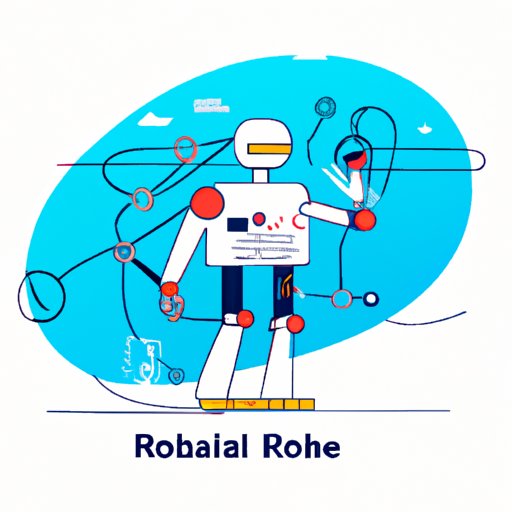Introduction
Robotics and artificial intelligence (AI) are rapidly advancing fields that are transforming the way we live, work, and interact with each other. Robotics is the science of designing, building, and programming machines to perform tasks autonomously or semi-autonomously. AI is a branch of computer science that focuses on creating intelligent machines capable of performing tasks that would normally require human intelligence. This article will explore the latest developments in robotics and AI, the ethical implications of robots in society, the potential applications of robotics in healthcare, and the challenges of creating autonomous robots.

Latest Developments in Robotics and AI
In recent years, robotics and AI have made tremendous progress in terms of technological advancement. Cutting edge technologies such as self-driving cars, facial recognition systems, and virtual assistants are becoming increasingly commonplace. These technologies are making it easier for humans to interact with machines, as well as offering new opportunities for automation and efficiency. In addition, robotics and AI are being used to explore new frontiers in space exploration, medical research, and more.

Ethical Implications of Robots in Society
As robots become increasingly integrated into our lives, it raises questions about the ethical implications of these machines. For instance, who is responsible when a robot causes harm? Who has control over how robots are used and programmed? Furthermore, as robots become more intelligent, there are concerns about how they will interact with humans and whether they could potentially be used to exploit people. These are complex issues that need to be addressed in order to ensure that robots are used responsibly and ethically.

How Robotics Will Shape the Workforce of Tomorrow
Robotics and AI are already having a significant impact on the workforce of tomorrow. Automation is reducing the need for certain types of labor, which is leading to job losses in some sectors. However, there are also many benefits associated with robotics for workers. For example, robots can take over dangerous and tedious tasks, allowing humans to focus on more creative and rewarding work. Additionally, robots can improve the accuracy and speed of certain processes, resulting in increased productivity and efficiency.
Potential Applications of Robotics in Healthcare
The healthcare industry is another area where robotics and AI are having a major impact. Robotics can be used to improve diagnosis and treatment, as well as to enhance the quality of care. For instance, robots can be used to perform surgery with greater precision than ever before. Additionally, AI-powered chatbots can provide personalized health advice to patients, while robotic exoskeletons can help those with mobility impairments to move around more easily.
Impact of Robotics on Global Economies
Robotics and AI are also having a profound effect on global economies. The adoption of robotics and AI can lead to increased economic opportunities, as businesses can increase their productivity and efficiency through automation. At the same time, there are challenges associated with the adoption of robotics and AI, such as ensuring access to jobs and resources for those displaced by automation. Additionally, governments must create policies to ensure that robotics and AI are used responsibly and ethically.
Security Risks Associated with Robotics in the Home
As robots become more commonplace in homes, there are security risks that must be taken into consideration. Cybersecurity is a major concern, as hackers could potentially gain access to personal data stored on connected devices. Additionally, privacy issues such as the use of facial recognition technology and audio recording devices raise important questions about how much information companies should be allowed to collect from users.

Challenges of Creating Autonomous Robots
Creating truly autonomous robots is one of the greatest challenges facing robotics and AI today. This requires developing sophisticated artificial intelligence systems that can process and react to their environment in real-time. Additionally, machine learning algorithms must be developed to enable robots to learn and adapt as they encounter new situations. To achieve this, researchers are exploring a range of techniques, including deep learning, reinforcement learning, and natural language processing.
Conclusion
Robotics and AI are rapidly advancing fields that are already having a significant impact on our lives. As these technologies continue to evolve, they will open up new possibilities for automation, efficiency, and improved quality of life. However, there are still many ethical and technical challenges that must be addressed in order to ensure that robotics and AI are used responsibly and safely. Ultimately, the future of robotics and AI will depend on how we choose to use these powerful tools.
(Note: Is this article not meeting your expectations? Do you have knowledge or insights to share? Unlock new opportunities and expand your reach by joining our authors team. Click Registration to join us and share your expertise with our readers.)
